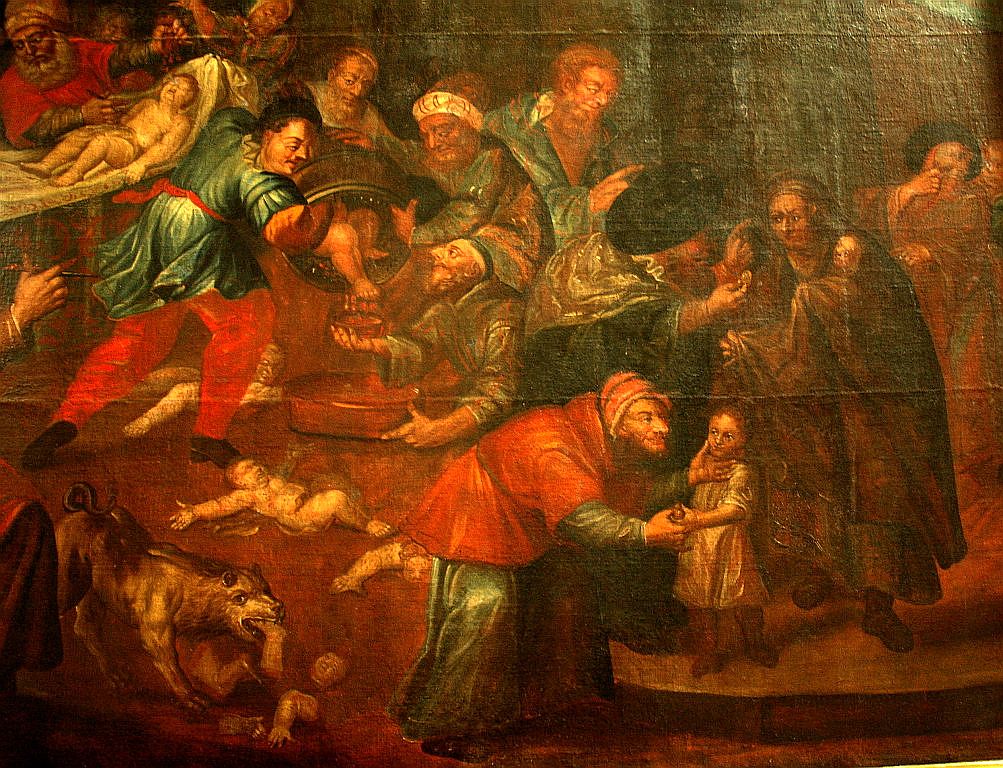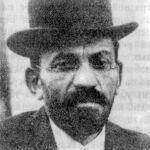In Kiev, in 1911, a Jewish factory manager named Mendel Beilis was indicted for murdering a young boy. Many believed that Beilis had carried out the murder as part of a ritual known as the “blood libel,” in which Jews used the blood of gentile children for baking Passover matzo. Where the idea of the “blood ritual” come from and why did people all over the world believe it? And what happened to Mendel Beilis?
Historian Robert Weinberg, who teaches Russian history at Swarthmore College is here to answer these questions.
Guests
 Robert WeinbergIsaac H. Clothier Professor of History and International Relations at Swarthmore University
Robert WeinbergIsaac H. Clothier Professor of History and International Relations at Swarthmore University
Hosts
 Joan NeubergerProfessor of History, University of Texas at Austin
Joan NeubergerProfessor of History, University of Texas at Austin
Maybe we could start by giving us a brief overview of the affair, the Beilis trial, and sort of set the scene.
Ok, so it’s March 1911 in Kiev. A young boy, about 12 years old, is found sitting up in a cave in the outskirts of Kiev with about 4 dozen knife wounds all over him. They were able to identify the boy because his schoolbooks were next to him. He decided not to go to school that day, but came to this neighborhood to see an old friend. At first the police thought that maybe his family may have been involved in the murder, because there’s a rumor that he had an inheritance and they were maybe trying to get hold of the money, but soon after, within a week or so, some local right-wing anti-Semites known in general terms as the Black Hundreds, began to claim that this was a ritual murder, that Jews had been involved in this kids murder in order to collect the blood for the baking of matzo. This was right around Passover, Easter time, and this is, I can talk more about that the history of that kind of claim.

Why don’t we stop there. Why don’t you tell us about what the history of blood libel is?
Ok, so beginning in the 12th century in England, the accusation emerged that Jews needed gentile blood, preferably of young gentile boys and girls, for variety of religious and ritual purposes, for example Jews might want to mock the passion of Christ, and so they needed for that, or they were desecrating the host, and they need blood for that, or the Jews had a particular concern about blood because of circumcision and so forth.
By the 13th century it becomes mostly an accusation that Jews actually consume the blood in form of matzo. So the Vatican, the Popes, issue, over the centuries, papal bulls condemning this false accusation, but the local populace, and the clergy as well, continue to believe it, and the accusation spreads from England, into France, into Germany, and central Europe, and by the late 15th century it’s the high point. There’s a very famous trial in 1475 in Trent where a community of Jews are accused of killing a Christian boy for the blood. Several of them are put to death and so on, so forth.
But the accusation begins to die out during the reformation, but it moves eastward. Eastern Orthodoxy didn’t really fixate too much on the blood libel but the Catholic Church begins to pick it up and it sort of finds a new home in what we would call Poland or the Polish Lithuanian Commonwealth, and that’s where the vast majority of European Jews live and when Russia acquires a chunk of this commonwealth with a lot of Jews, it begins to spread into Russia proper …
At the end of the eighteenth, early nineteenth century.
Yes, throughout the nineteenth century, it sort of becomes a popular belief. By 1900 many Christians in the Russian empire would believe it. These accusations tend to occur at Easter and Passover time and there were always these accusations in every Jewish community, that they need blood. No one ever asked the basic question: if that was the case then why aren’t there tens of thousands of accusations every year saying children are missing. Usually the children are killed by someone else, or they went missing, ran away…
So it was a popular sort of myth of anti-Semitism.
Yes, for example, let’s say you run away from home but then you get caught, so you don’t want to get punished by your parents, so you say a bunch of Jews kidnapped me…
And tried to take my blood…
Yeah.

This becomes a real cause célèbre. So who is Mendel Beilis, and why was he accused?
Mendel Beilis is a nondescript man, late 30’s, 5 children, manages a brick factory near these caves on the outskirts of Kiev, well liked…
He was relatively wealthy if he manages a factory?
Not really, no…
Not wealthy, but not poor.
Not poor, but… and he well liked by the local community, the Christian and Jewish community, he would do favors for the local church at times, funeral processions for the brick yard, so he’s not really a visible presence and its not clear exactly how they decide to focus on him, but within a month or two of the murder, a local policeman detective and a new prosecuting attorney replace the original ones, and they decide to say that this is a ritual murder. It’s not even clear whether they believed it or not, it’s irrelevant, but they believe that if they don’t act on this, the right wing groups would cause a lot of social unrest, so they decide to look for a Jew that would be a perfect target, and since Beilis is in a brick factory near these caves they arrest him, and they manufacture a case against him.
So before we turn to the case and the trial, did they ever find out who really killed him?
Well that’s not clear. The most accurate scenario that I think people believe is that the friend that this boy Andrei had come to visit, his mother and her gang of thieves killed the boy, because the boy had a fight with this woman’s son, and said, well I’m angry at you, I’m going to tell the police what you’re mother does because she’s a fence and there’s all these stolen goods in the apartment. So they believe that they killed him one afternoon, a Saturday afternoon, when he was in the apartment and then moved the body, but that’s problematic. She’s probably responsible for these murders, however there’s some problems with that because he is killed on a Saturday, and his body’s not moved until Tuesday to the caves, right? It’s March and it may be cold, but bodies do smell after a few days. No one ever talked about that, and its not clear how this one woman, because the gang of thieves all left for Moscow where they got arrested for doing some other criminal activity, so it’s not clear how the body got to the cave, because it wouldn’t have happened during the day, because people are around, so its not clear.
Why this case? Why was there a trial? It’s Kiev, 1911. Why does the government decide to make a big trial out of it?
Ok, so it’s not part of a grand conspiracy orchestrated in St. Petersburg but the local prosecutor and police detective get the ear of the Minister of Justice, who says “yeah sounds good to me, go for it.” Many of these people highly educated, so who knows whether they believed it or not. Tsar Nicholas II seemed to believe that the Jews were capable of this kind of crime. Some people think maybe it was a way to curry favor with the Tsar and his close advisers, that they would like this. My sense is that at this time there was some talk of ending the Pale of Settlement.
So the Pale of Settlement, where Jews are required to live in a special area of Ukraine and Belarus.
Residency restrictions, and that was the so called Pale of Settlement, and there was some talk of maybe eliminating that, and that would fit in with maybe Peter Stolypin’s, the prime minister’s, overall reforms of trying to modernize Russia in some sense, so this a way.
Ending the restrictions on where Jews could live?
That would be good for the economy and so on and so forth, and that didn’t sit well with the very conservative folks in the Russian government and society so they thought maybe if we can prove to the world that Jews are capable of this kind of behavior they’ll stop complaining of our discriminatory policies toward Jews. I think that is a good explanation, and it sort of allows for some acceptance of the belief that there is this conspiracy. The top Minister of Justice, Minister of the Interior, support this but probably it was a ploy that backfired.
So tell us about the trial. How did it backfire?
Ok so Beilis is arrested in July 1911. He gets an indictment in January 1912, so he’s sitting in prison, he’s not allowed to see anybody, his family, lawyers, and so on. The indictment comes out accusing him of killing this boy Andrei for the blood. After a month or two people begin to realize the government has no hard evidence of any sort connecting Beilis to the murder, so they redo the indictment, and it’s not until the following year, if I’m not mistaken, 1913. So he’s going to be in prison over two years before the trial, July 1911 to September 1913, where they sort of now emphasize the ritual murder aspect. Beilis with some other unknown co-conspirators are engaged in this, and they just suborn perjury and collect all this false evidence. A lot of the damning evidence against Beilis comes from this boy’s mother, the thief, who has a real interest in proving that she’s not the guilty party, plus she’s also a member of the Black Hundreds so the Black Hundreds also wanted to protect her. This woman had been in jail before. She was not a good person, not a good mother. I mean, just to get ahead of the story, she’s killed by the Bolsheviks in the Civil War.
So what happens? Is he convicted?
So, 30 days, there’s all this testimony you can read, and there’s just no evidence against Beilis, but they try to manufacture a case saying that Beilis and some others are engaged in this ritual murder. There are witnesses that retract, or say, yes the police beat me to say this, and then they change the testimony the next time so it’s just riddled with holes, and the jury, which is comprised of 12 jurors, come back and 7-5 say yes, the murder has the features of a ritual murder, however, it comes back tied, saying that Beilis was responsible, so because it was a tie verdict, he walks. And the government after they had reissued the second indictment focusing on ritual murder rather than on Beilis himself, claimed victory because now we can show the world that Jews actually engage in this kind of behavior. And we should be careful about sort of, lifting the restrictions on them.
Was there another trial?
No. No other trial. He’s released, sober minds realized they don’t have a case against him, but they prove that it’s a ritual murder so they are happy with that result, and he picks up with family and moves to Palestine.
Do you know anything about Beilis’ life after he leaves Russia?
It’s sort of sad. Before he moves to Palestine, all he wants to do, he says, is get some land and farm, and people promise him all this money on lecture tours, and he decides he just wants to go to Palestine, and then World War I breaks out and all the money that people had donated to him gets frozen in a British bank because now Germany sort of controlled the bank, it was a German bank or something, so he has a tough time with the five kids. One of the kids is in the British military, and he never really finds a way to make a living, certainly not in Palestine. People are still trying to encourage him to take a lecture tour. After the war in the early 1920’s, people encourage him to go to Europe, go to the United States, speak. One suggestion was that he could, sort of, sit on a stool like in an entrance of Macy’s, or the equivalent of Macy’s, and greet people. That was beneath the dignity of the great Beilis. I mean he was world famous because of this case, and so I would assume pretty much any educated Jew in the United States, England, Western Europe, would know who he is.
This case won international attention?
Yes, you could’ve read about in New York Times, certainly while the trials occurred in September 1913, everybody was writing about it, and it was probably the most famous case of blood libel, ritual murder, that has ever occurred.
So there are plenty of examples of anti-Semitism, racism, trials that shouldn’t have been held, why did this one catch people’s imagination, make everybody want to write about it?
That’s a good question. I’m not sure why this, more than lets say Leo Frank.
Leo Frank who was accused of murder in….
…in the south. Dreyfus in France in the 1890’s, because, before this, was just as well known. But I think the Beilis case becomes more important, one, because it circulates strongly in the United States press, and there’s outrage, and it’s the Russian empire not France, so maybe Dreyfus is guilty of selling military secrets, but Beilis, this is Russia right? I mean if you told me today that the Russian government was hacking computers, why not believe it? You can excise that part. (laughter)
No, I think that’s a good example, so actually are there blood libel accusations today.
You can find them. I realized when I was writing my book why I became interested and I had totally forgotten about this, but in 1992, I was in Moscow working in the Lenin Library, and a friend/colleague, Mark Steinberg, was with me, and we noticed these people out in the plaza demonstrating, and we didn’t know what it was, but Mark is curious, so he went out and said what’s going on. Oh and they had these signs saying “Don’t give away our national treasures.” He says, what is this. They said there was a collection of books in the basement of the Lenin Library of Jewish texts that had been there since 1917, tens of thousands of manuscripts, books, and they belong to the Lubovitcher Hassidic rebbe and his successor, and that these books were going to be repatriated to Brooklyn where the Lubovitcher have their headquarters. A Russian court said yes they have to be repatriated. These protestors when they heard about this, and mind you, nobody had looked at these in 60-70 years, nobody could read them, but these books contained the secret of the blood libel, and we can’t allow these crafty Jews to take them, spirit them to the United States where they could hide the secrets from everybody. And the books are still there, some of the books…
The books are still there in Moscow?
Some of the books were allowed to go to Brooklyn, get digitized, or Xeroxed, or microfilmed and returned. It was only a few years ago that a federal appeals court in the United States settled the case, saying these books belong in Brooklyn. And the Russian government won’t give them over.
Do we know anything about the books?
They don’t read the language, it’s Hebrew or Yiddish, so nobody can read the books. That’s why it’s so easy for these rumors or these beliefs to spread, right? Here are these Jews, they’re engaged in this religious practice, I can’t understand a word they’re saying and who knows, I mean we can’t read all these commentaries they have, but then also in the 1990s if I’m not mistaken, there was an argument put forth in some Italian church newspaper about, no, the ritual murders should be looked at again. There was a comment a few years ago in the Hungarian parliament about reexamining a very famous blood libel case from 1880, 1882, and then there was this woman on the Oprah show who talked about ritual murder and the Jews needing the blood for some religious purposes.

So this is a myth that has a lot of power, comes up over and over again.
And you can find it in newspapers in the Middle East, when they need to attack Israel, sometimes they talk about ritual murder along with the Protocols of the Elders of Zion, so it all fits into an anti-Israel diatribe. There was something ten years ago, some belief that Israeli doctors were harvesting organs of Palestinians for blood ritual purposes. My feeling is anti-Semitism doesn’t tell you anything about Jews, it tells you everything about gentiles, and what they fear and don’t fear. The reason I think this ritual murder myth caught on, according to some historians, is that about the same time in the early 13th century the church sort of solidified it’s belief that transubstantiation, that the wine and wafer of the Eucharist, actually become the blood and body of Christ, and some people believe that Christian believers, right, you should sort of be horrified that you’re actually cannibalizing Christ, so they can’t–
So sort of projecting their…
…they’re projecting onto the Jews, and that makes sense too, but you know, you don’t want to believe it about yourself, but you can believe it about the Jews who are suspicious anyway, we don’t know what they’re doing.